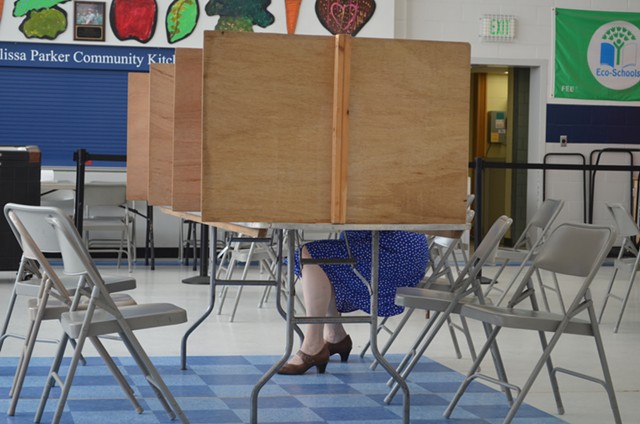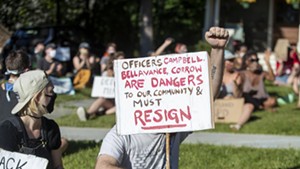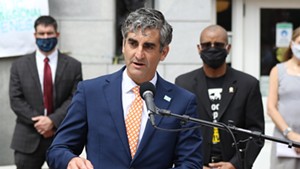
- FILE: Alicia Freese
- A voter in Burlington's Old North End.
Updated on December 2, 2019.
A group of Progressive Burlington city councilors wants to resurrect ranked-choice voting, a controversial election method that Queen City voters repealed nearly a decade ago.
Councilors Jack Hanson, Brian Pine and Max Tracy will introduce a resolution on Monday that seeks to place a question on the March 2020 ballot to reinstate the election system. If approved, the topic will go to the council’s Charter Change Committee for consideration.
Councilors Perri Freeman (P-Central District) and Sharon Bushor (I-Ward 1) have also signed on as cosponsors of the measure.
Ranked-choice voting, also known as instant runoff, allows voters to rank candidates in order of preference. If none wins a majority, the last-place finisher is eliminated. Votes for that candidate are then assigned to voters’ second choice until one candidate gets a 50 percent majority.
Under the current system, a candidate can earn just 40 percent of the vote to win an election for mayor, city council or school board. The system puts independent and non-major party candidates at a disadvantage, the resolution says, and forces voters to choose the candidate who is most likely to win instead of who they favor most.
"In Burlington, there’s alway been a long tradition of being ... a multiparty city," said Pine, a Ward 3 prog. "This is a well-tested way to ensure that you can have a more pluralistic political system."
Burlington used instant runoff from 2005 until 2010, when voters repealed it by a
52 to 48 percent margin. Current City Council President Kurt Wright (R-Ward 4) led the effort to change the system after he lost the 2009 mayoral race to incumbent Bob Kiss, despite besting the Prog in the first few rounds of ranked-choice voting.
Wright remains opposed to instant runoff and thinks the Progressives are introducing “a major, controversial change” far too late in the year. Charter changes require a public hearing before they can be added to the ballot, which has to be finalized in January, he said.
“There is no perfect voting system, but I think that the flaws in this system that’s being proposed are significantly greater than what we have now,” Wright said.
The Progs argue that ranked-choice voting has numerous benefits. Hanson said it encourages third-party hopefuls to run for office without fear of splitting votes between similar candidates. Many voters also feel like their vote is wasted on a third-party candidate, even if that person best aligns with their ideals, he said.
"It’s not right. It’s a very flawed system that we’re operating under that discourages more than two people from running," said Hanson, the council's East District representative. "Voting is a fundamental right, and your vote should be able to relate your values and what you want to see. It should not be a strategy of harm reduction or preventing your most hated candidate from getting in."
The ranked system would also discourage negative campaigning because it “encourages candidates to focus on their positive vision for voters” as they compete for second and third-round votes, according to the resolution.
The proposal already has support from a cadre of current and former politicos, who wrote a letter this week urging the council to advance the measure.
"Ranked choice voting is a non-partisan issue that is fundamentally about improving and expanding access to our democratic process," reads the letter, which was cosigned by state Sens. Phil Baruth (D/P-Chittenden) and Chris Pearson (P/D-Chittenden), plus a handful of House representatives from Burlington and former governor Howard Dean.
The Vermont legislature is considering its own
move to implement ranked-choice voting. H.444 would permit the method in primary elections for statewide offices but not for legislative seats. If passed, it wouldn’t take effect until 2024.
The Vermont bill is modeled after one passed in Maine, which adopted the system in 2016. Other areas — including cities in Massachusetts, California and Minnesota — have switched to instant runoff voting, and earlier this month, New York City voters supported a ballot item to implement ranked-choice voting by a three-to-one margin.
Hanson thinks times have changed since Burlington voters repealed instant runoff.
"It's time to give voters another opportunity to weigh in on it," he said.
Read the full city council resolution here:

















Comments (28)
Showing 1-25 of 28
Comments are closed.
From 2014-2020, Seven Days allowed readers to comment on all stories posted on our website. While we've appreciated the suggestions and insights, right now Seven Days is prioritizing our core mission — producing high-quality, responsible local journalism — over moderating online debates between readers.
To criticize, correct or praise our reporting, please send us a letter to the editor or send us a tip. We’ll check it out and report the results.
Online comments may return when we have better tech tools for managing them. Thanks for reading.